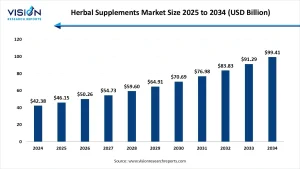The global herbal supplements market size was estimated at around USD 42.38 billion in 2024 and it is projected to hit around USD 99.41 billion by 2034, growing at a CAGR of 8.90% from 2025 to 2034.
Get a Sample@https://www.visionresearchreports.com/report/sample/37330
Herbal Supplements Market Overview
The herbal supplements market continues to gain global traction as consumers increasingly seek natural solutions to support their health and well-being. Herbal supplements are plant-derived products used to improve general health, treat specific conditions, and prevent illnesses. With rising interest in organic, chemical-free health alternatives and increased awareness of preventive healthcare, herbal supplements have become a popular choice among all age groups.
The market includes a wide variety of products such as tablets, capsules, powders, and liquid extracts, catering to various health needs like immunity boosting, digestive health, weight management, and mental wellness. This growing acceptance is being supported by robust product development, expanding retail channels, and a shift towards sustainable living.
Herbal Supplements Market Growth
The global herbal supplements market was valued at approximately USD 42.38 billion in 2024 and is projected to reach nearly USD 99.41 billion by 2034, growing at a CAGR of 8.90% from 2025 to 2034. The growth is largely driven by a shift in consumer preferences from synthetic products to natural remedies.
Demand is especially high in developed regions such as North America and Europe, where people are embracing holistic wellness trends and traditional therapies. Meanwhile, emerging economies like India, China, and Brazil are experiencing strong market expansion due to traditional medicine practices, government initiatives supporting Ayurveda and TCM (Traditional Chinese Medicine), and increased disposable incomes.
Herbal Supplements Market Dynamics
Drivers
- Growing awareness of health and wellness
- Popularity of traditional herbal medicine systems like Ayurveda and TCM
- Rising geriatric population with a focus on preventive care
Opportunities
- Expansion into untapped rural and semi-urban markets
- Product innovation using lesser-known regional herbs
- Partnerships with nutraceutical and pharmaceutical companies
Challenges
- Lack of global regulatory standardization
- Risk of adulteration and false labeling
- Limited clinical trials and scientific backing for some herbal claims
Applications in the Market
Herbal supplements play a vital role in nutritional support, offering daily multivitamins, iron-rich herbs for anemia, and anti-inflammatory botanicals that contribute to overall well-being. These supplements are commonly used to fill nutritional gaps and support immunity and digestive health through natural ingredients.
In the sports and fitness sector, herbal supplements like ginseng and ashwagandha are popular for enhancing stamina, energy levels, and muscle recovery. Athletes and fitness enthusiasts often turn to these plant-based options as natural alternatives to synthetic performance enhancers.
The cosmeceutical industry also benefits from herbal supplements, which are increasingly used for skin enhancement, acne treatment, and anti-aging. Ingredients like neem, aloe vera, and turmeric help improve skin tone and texture while reducing oxidative stress.
Herbal Supplements Market Trends
- Clean Label Movement: Consumers are demanding transparency in product ingredients, propelling companies to formulate herbal supplements with non-GMO, vegan, and allergen-free ingredients.
- Rise of E-Commerce & Direct-to-Consumer Brands: Online channels have become a primary sales platform, allowing small and mid-sized herbal supplement brands to thrive.
- Increased Interest in Preventive Healthcare: The post-pandemic health-conscious culture has led to heightened demand for immunity boosters, adaptogens, and anti-stress herbs.
- Personalized Supplements: The emergence of AI-driven health platforms and DNA-based diet plans is creating demand for tailored herbal supplement formulations.
Read More:https://www.heathcareinsights.com/rsv-vaccines-market/
Top Companies in Herbal Supplements Market
- Nature’s Bounty Co.
- Gaia Herbs
- Schwabe Group
- NOW Foods
- Bio-Botanica Inc.
- Herbalife Nutrition Ltd.
- Nutraceutical Corporation
- GNC Holdings LLC
- Arkopharma Laboratories
Market Segmentation
By Product
- Moringa
- Echinacea
- Flaxseeds
- Turmeric
- Ginger
- Ginseng
- Others
By Formulation
- Tablets
- Capsules
- Liquid
- Powder
- Soft Gels
- Others
By Consumer
- Pregnant Women
- Adults
- Pediatric
- Geriatric
By Distribution Channel
- Offline
- Pharmacies & Drug Stores
- Hypermarkets/Supermarkets
- Others
- Online
By Regional
- North America
- U.S.
- Canada
- Mexico
- Europe
- UK
- Germany
- France
- Italy
- Spain
- Denmark
- Sweden
- Norway
- Asia Pacific
- Japan
- China
- India
- Australia
- South Korea
- Thailand
- Latin America
- Brazil
- Argentina
- Middle East and Africa (MEA)
- South Africa
- Saudi Arabia
- UAE
- Kuwait
Future Outlook
The herbal supplements market is poised for substantial growth, fueled by rising consumer inclination toward holistic health, preventive care, and natural healing. Innovation in extraction technologies, sustainable sourcing, and greater scientific validation will shape the next phase of growth. Companies that focus on transparency, education, and localized product development are likely to lead in the coming decade.
Buy this Premium Research Report@https://www.visionresearchreports.com/report/checkout/37330
You can place an order or ask any questions, please feel free to contact
sales@visionresearchreports.com| +1 650-460-3308
